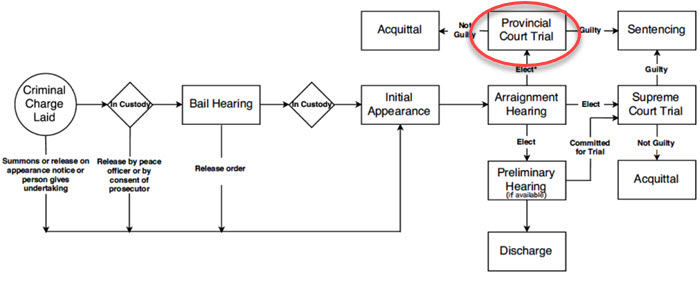Preparing for trial
If you choose to have a trial in Provincial Court, you should start preparing soon after you’re charged. You may wish to have witnesses testify on your behalf. If you do, you must make sure that they come to court on the day of the trial. You can ask them to come to court, or you can obtain subpoenas from a justice of the peace at the court registry. A subpoena is a court order requiring a witness who has material evidence to come to court. If you have a lawyer, they will take care of interviewing and subpoenaing your witnesses.
Find resources to help prepare for a trial.

Trial Procedure
At the trial, the Crown prosecutor will present (“call”) witnesses to testify and say what they know about the matter. A witness must swear a religious oath or make a non-religious solemn affirmation before testifying. When children testify they simply promise to tell the truth.
The prosecutor questions each Crown witness first. Then you, or your lawyer if you have one, may question (“cross examine”) the witness. After all Crown witnesses have been heard you may testify and/or present and question defence witnesses. The prosecutor may cross-examine you, if you testify, and cross-examine any witnesses you call.
Presumption of innocence
As an accused person, you don’t have to prove that you’re innocent. You don’t have to testify, call any witnesses, or offer any evidence at all at your trial. However, you may decide that it’s in your interest to do so, especially if the Crown appears to have a strong case against you. If you have a lawyer, they will advise you, but it’s up to you to decide.
The evidence in the trial consists of the witnesses’ testimony and any photographs, documents or other items adequately identified by a witness and ruled admissible by the judge. After all the evidence has been introduced, both Crown and defence sum up their positions in closing argument.
You can only be found guilty (“convicted”) of an offence if the evidence in the trial proves your guilt beyond a reasonable doubt. The judge is responsible for deciding whether the evidence meets that test, ensuring you have a fair trial, and ensuring your rights are protected. If the evidence does not prove you guilty, the charge will be dismissed (you will be “acquitted”).
Appeal
If either an accused person or the Crown believes the judge has made an error they may file an appeal within 30 days of acquittal or 30 days of the date a sentence is imposed.
See Basic Criminal Procedure and Resources for Criminal Cases for more information on conducting a trial.
This website provides general information only and should not be used as a substitute for legal advice.
Updated February 2020

